Miranda V Arizona Drawing, Web the supreme court’s decision in miranda v.
Miranda V Arizona Drawing - Web in the landmark case miranda v. Supreme court on june 13, 1966, established the miranda warnings, a set of guidelines for police interrogations of criminal suspects in custody designed to ensure that suspects are accorded their fifth amendment right not to be compelled to incriminate themselves. The culminating activity is completing and discussing the worksheet comparing four circuit court cases to identify common factors that courts use to make that determination. The defendants offered incriminating evidence during police interrogations without prior notification of their rights under the fifth amendment of the united states constitution (the “constitution”). Miranda was not informed of his fifth amendment right to remain silent or right to have counsel present. Web empirical scholarship on miranda suggest that the miranda requirements have exerted a negligible effect on the ability of the police to elicit confessions and on the ability of prosecutors to win convictions. They asked the witness whether she could identify the person who committed the crime. Evidence of each confession was used at trial. Arizona, the supreme court established that police must inform anyone interrogated in police custody that they have the following constitutional rights: Bogart, georgia context & purpose this lesson introduces a unit that explores the judicial branch and how its design protects the supreme court’s Miranda was not informed of his fifth amendment right to remain silent or right to have counsel present. Supreme court on june 13, 1966, established the miranda warnings, a set of guidelines for police interrogations of criminal suspects in custody designed to ensure that suspects are accorded their fifth amendment right not to be compelled to incriminate themselves. A lesson. Web ernesto miranda was accused of a serious crime. Web • gain insight into the reasoning used by the supreme court in miranda v. Arizona, featuring a chronology of key events and original documents from supreme court justices. Arizona, the supreme court established that police must inform anyone interrogated in police custody that they have the following constitutional rights: Web. The police brought miranda into custody, but they did not inform him of his right to remain silent or his right to an attorney. Ernesto miranda was arrested after a victim identified him as her assailant. Arizona (1966) culminated in the famed “miranda rights” requirement during arrests. Arizona, featuring a chronology of key events and original documents from supreme court. Miranda was taken into custody by police for purposes of interrogation, where he later confessed. Supreme court case of miranda v. Bogart, georgia context & purpose this lesson introduces a unit that explores the judicial branch and how its design protects the supreme court’s • explore the development, use, impact, and controversy surrounding the miranda warnings. On appeal, the supreme. • explore the development, use, impact, and controversy surrounding the miranda warnings. Arizona, the supreme court ruled that anyone accused of a crime must be warned about the right to remain silent and the right to an attorney. The defendants offered incriminating evidence during police interrogations without prior notification of their rights under the fifth amendment of the united states. They found a witness and arranged for a lineup of possible suspects. Arizona addressed four different cases involving custodial interrogations. Web case summary of miranda v. Arizona, featuring a chronology of key events and original documents from supreme court justices. Under the fifth amendment, any statements that a defendant in custody makes during an interrogation are admissible as evidence at. Arizona, featuring a chronology of key events and original documents from supreme court justices. • explore the development, use, impact, and controversy surrounding the miranda warnings. Synopsis of rule of law. Sixth amendment right to an attorney. But how do students know if they are in custody? Under the fifth amendment, any statements that a defendant in custody makes during an interrogation are admissible as evidence at a criminal trial only if law enforcement told the defendant of the right to remain silent and the right to speak with an attorney before the interrogation started, and the rights were either. Sixth amendment right to an attorney. Web. Web under miranda, defendants are entitled to prophylactic warnings before any custodial interrogation. Arizona addressed four different cases involving custodial interrogations. Web miranda rights come into play when someone is in police custody. Bogart, georgia context & purpose this lesson introduces a unit that explores the judicial branch and how its design protects the supreme court’s A lesson plan using. Sixth amendment right to an attorney. Web the library of congress is marking this landmark anniversary with the launch of miranda v. In each of these cases, the defendant was questioned by police officers, detectives, or a prosecuting attorney in a room in which he was cut off from the outside world. Arizona (1966) culminated in the famed “miranda rights”. Evidence of each confession was used at trial. But how do students know if they are in custody? Arizona, the supreme court established that police must inform anyone interrogated in police custody that they have the following constitutional rights: Web the library of congress is marking this landmark anniversary with the launch of miranda v. Web the jury found miranda guilty. In each of these cases, the defendant was questioned by police officers, detectives, or a prosecuting attorney in a room in which he was cut off from the outside world. A lesson plan using the time magazine archive database from ebsco lesson overview name: On appeal, the supreme court of arizona affirmed and held that miranda’s constitutional rights were not violated because he did not specifically request counsel. Arizona, the supreme court ruled that anyone accused of a crime must be warned about the right to remain silent and the right to an attorney. Web the case came out of phoenix, arizona, and was decided by the nation's highest court in 1966. Supreme court on june 13, 1966, established the miranda warnings, a set of guidelines for police interrogations of criminal suspects in custody designed to ensure that suspects are accorded their fifth amendment right not to be compelled to incriminate themselves. Web this guide discusses the seminal u.s. The supreme court’s decision in miranda v. In each of these cases, the defendant was questioned by police officers, detectives, or a prosecuting attorney in a room in which he was cut off from the outside world. Sixth amendment right to an attorney. Web case summary of miranda v.
Miranda v. Arizona Fifty Years of Silence Romano Law
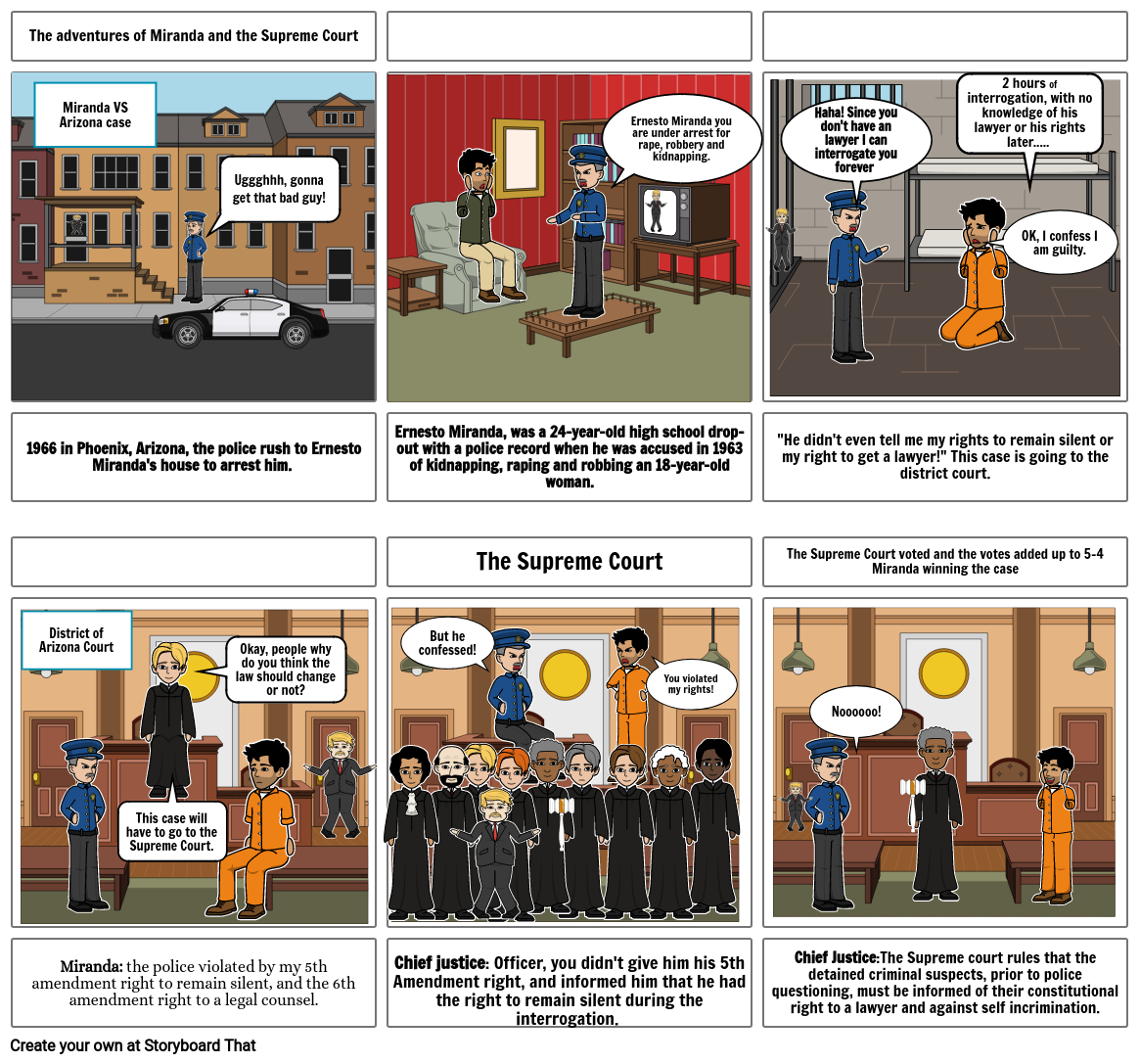
Miranda VS Arizona Storyboard von kraustar

Miranda v. Arizona Summary, Facts & Significance Video & Lesson
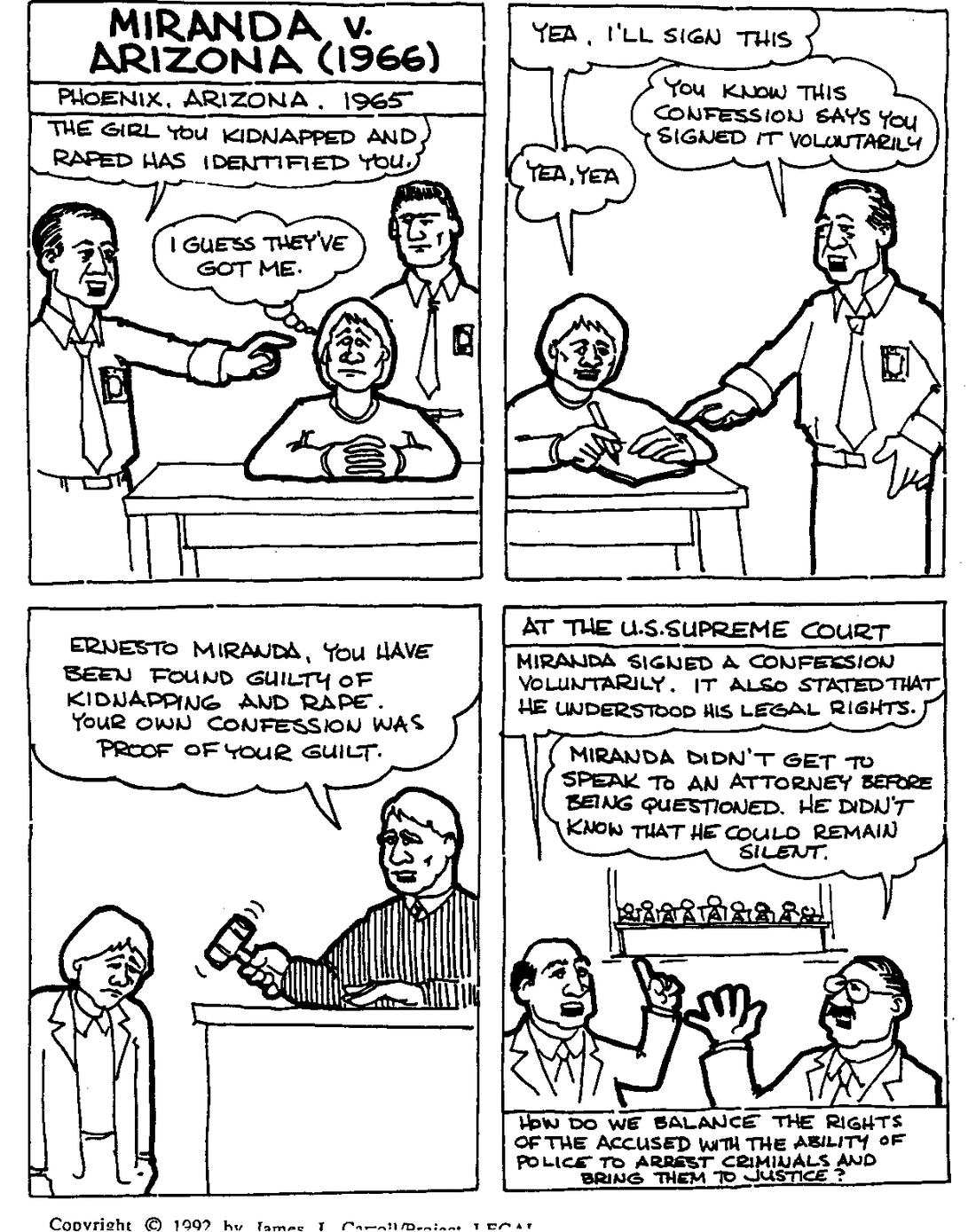
Miranda v. Arizona Civil Rights or Civil Liberties Supreme Court Cases
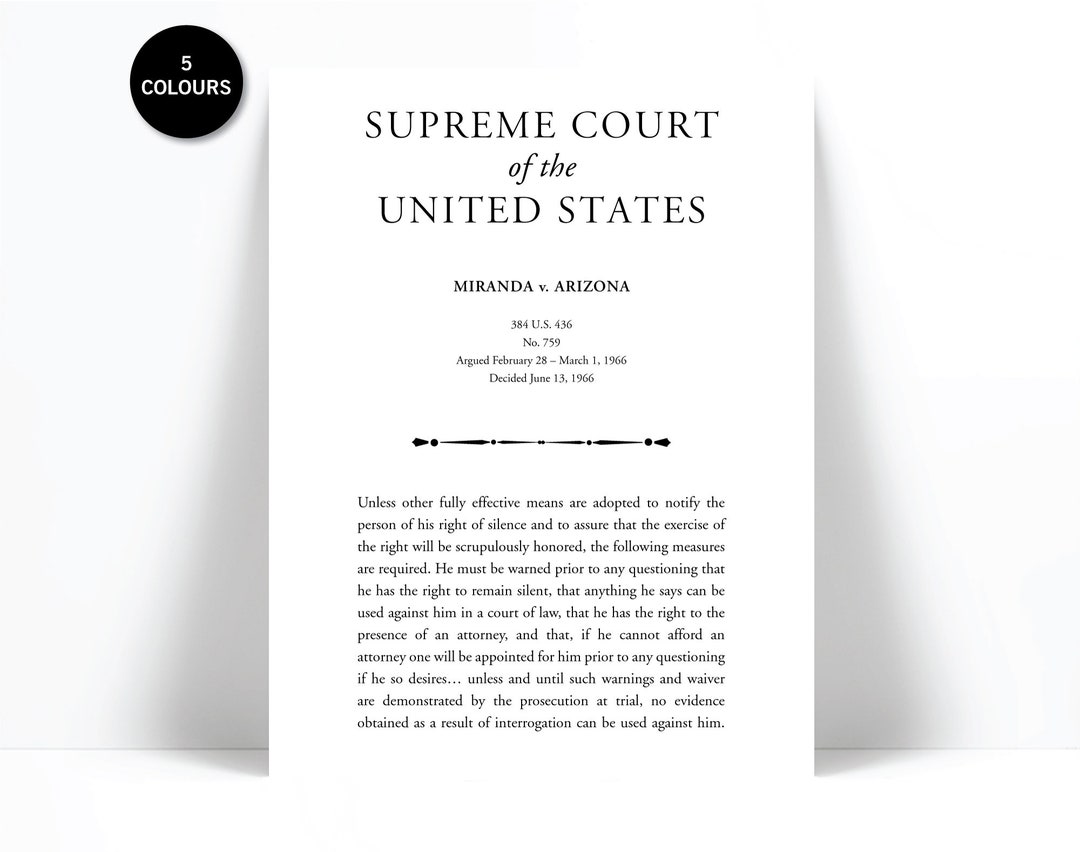
Miranda V. Arizona Art Print United States Supreme Court Case Quote
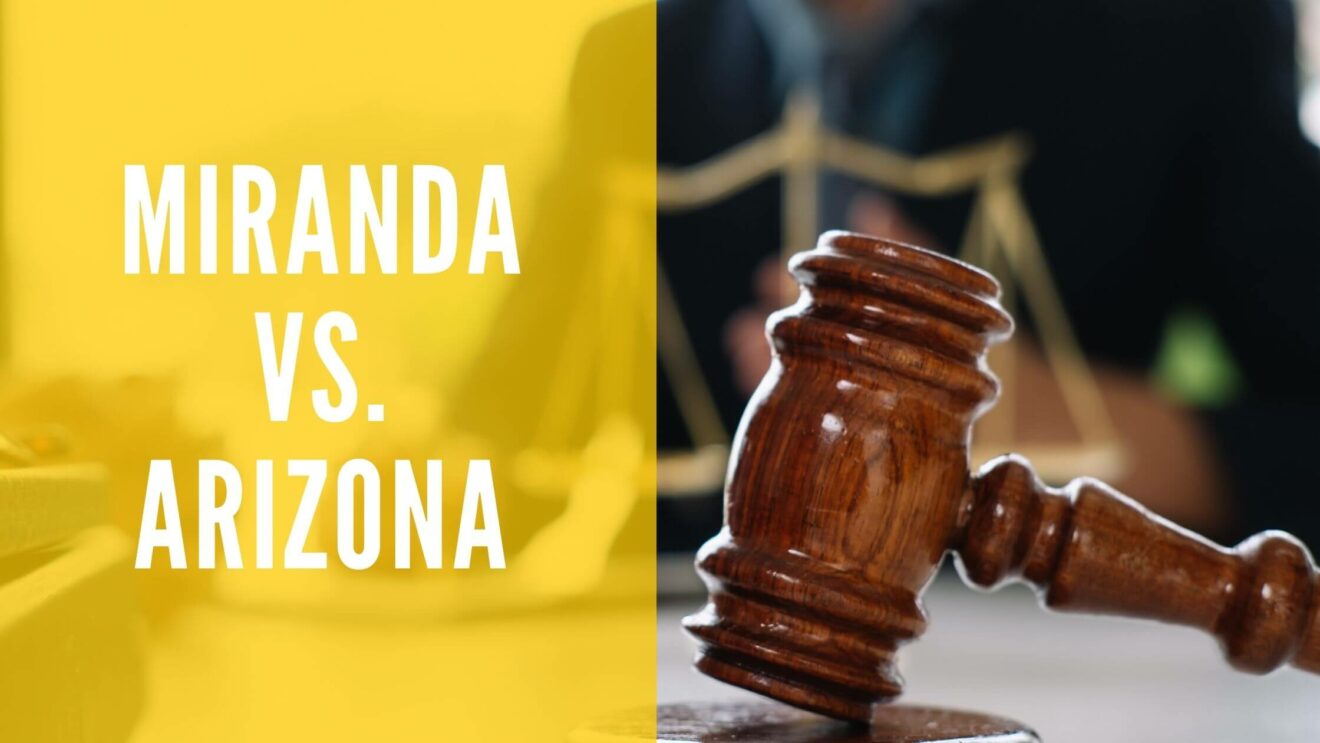
Miranda vs. Arizona Case
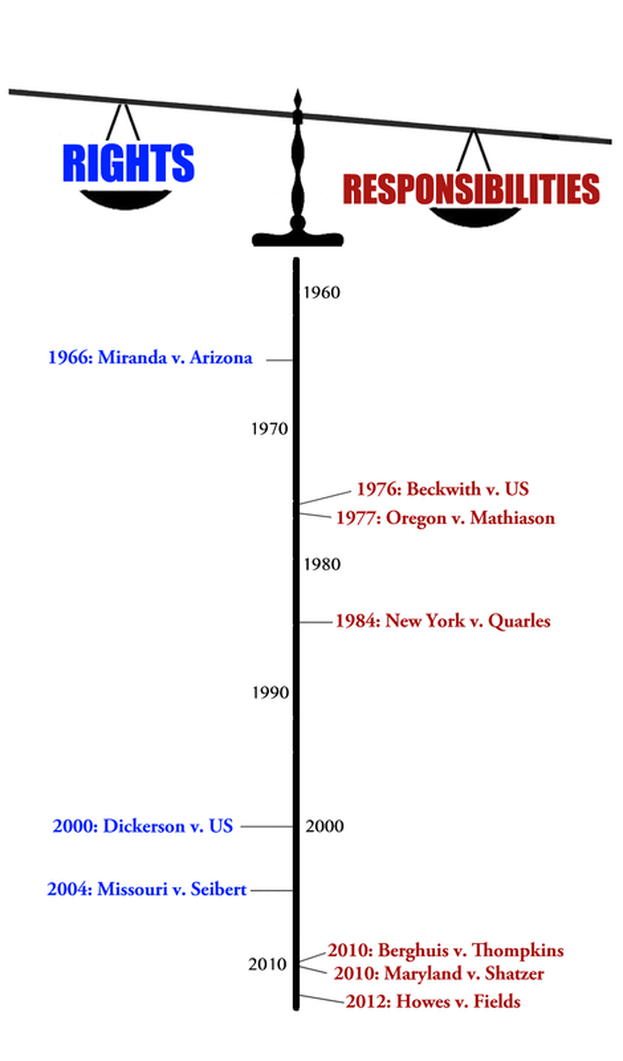
Miranda, Post 1966 Miranda v. Arizona Rebalancing Rights and
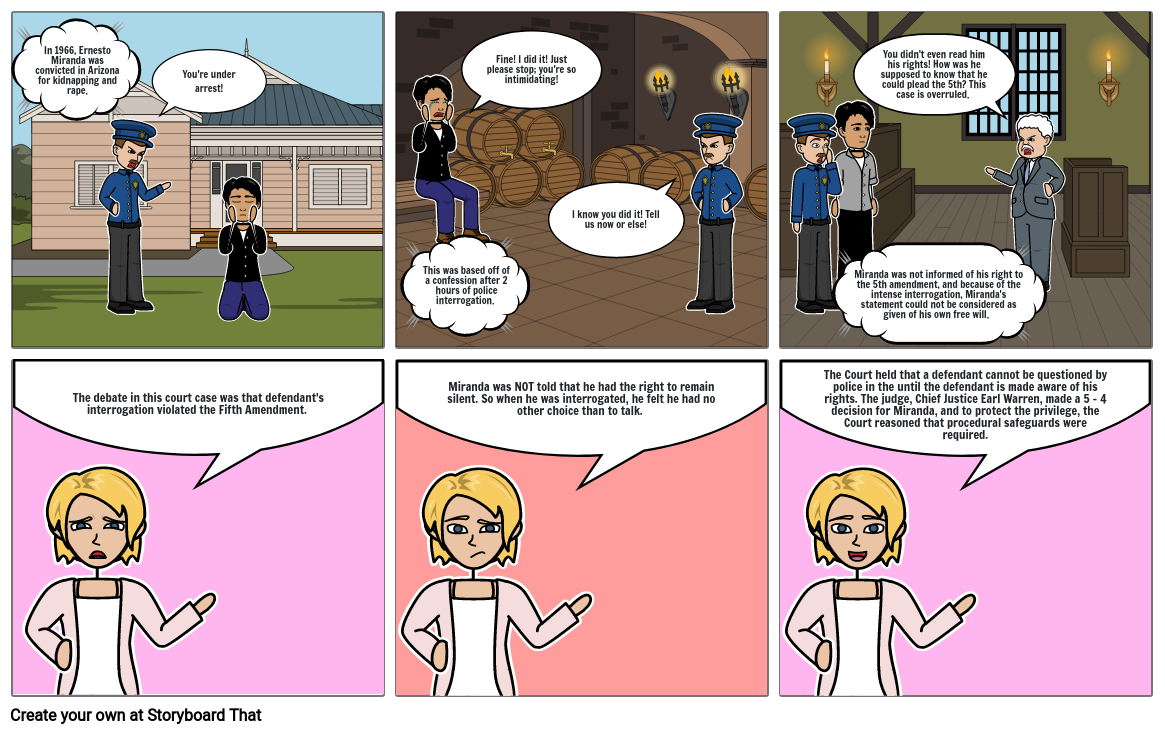
Miranda vs. Arizona Storyboard by 22ccf613

Miranda, Post 1966 Miranda v. Arizona Rebalancing Rights and

Miranda v. Arizona (SCOTUSToons) YouTube
The Rights To Justice, An Online Presentation Of Historical Documents That Shed Light On The Arguments Around, And The.
Supreme Court In Which The Court Ruled That Law Enforcement In The United States Must Warn A Person Of Their Constitutional Rights Before Interrogating Them, Or Else The Person's Statements Cannot Be Used As Evidence At Their Trial.
Web In The Landmark Case Miranda V.
436 (1966), Was A Landmark Decision Of The U.s.
Related Post: